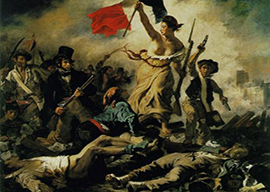
December 09, 2010

Each time I doubt that the National Review‘s mavens could surpass themselves, I discover fresh evidence of their invincible ignorance. Being a man of little faith, I didn”t believe that Rich Lowry could say anything dumber than his 2003 remarks about the Spanish Civil War which revealed he had no idea who fought whom in that bloody conflict. But now Rich has come up with something even more noteworthy: a view of human history in which circa 1800 “almost all the world was Bangladesh.” Rich paraphrases a book by Deirdre N. McCloskey celebrating “bourgeois dignity” and the modern era’s unexcelled glory. He quotes McCloskey’s encomium to our exalted place with glowing approval:
Starvation worldwide is therefore at an all-time low and falling. Literacy and life expectancy are at all-time highs, and rising. Liberty is spreading. Slavery is retreating.
Rich explains that capitalism can”t be credited for this happy turn of events “because the mere accumulation of capital is beside the point. The kings of Spain collected lots of gold from the New World and no economic miracle ensued.” What turned us from Bangladesh into the paradise on Earth that Lowry sees each morning while headed to work in the Big Apple is “innovation…[and] entrepreneurial “alertness,” the ceaseless drive for the new, the better, the cheaper.” Up until recently, he argues, we weren”t free to do this because “lords or bishops” controlled us. Then around 1820, “the fruit of the new dispensation first made itself felt.”
Although his column’s spatial limits may have prevented Rich from revealing his educational gaps” full depth, I”ll note a few errors in his unflattering picture of the European past coupled with his unrealistic glorification of the present. First, Rich demonstrates zero historical understanding of capitalism or economic development. Capitalism has nothing to do with the mercantile policies of Spain’s kings, who imported gold usually to fight Habsburg dynastic wars. Capitalism is not about allowing precious metals to accumulate in state treasuries. Since presumably even Rich knows this, why does he give inept examples of capitalist practice that stick out like sore thumbs? My daughter Barbara produces texts for middle-school students that provide a more accurate understanding of capitalism as a productive process than Rich’s column. She also tutors students in economics and would give them holy hell for stating the idiocies found in Rich’s nationally distributed pontifications.
The economic growth process that Rich refers to began centuries before 1820. Evidence of material improvement, extensive capital formation, and agricultural innovation existed in the eighteenth century and even before. According to Italian medieval historian Carlo Cippola, the volume of thirteenth-century commercial activity was only reached again in the eighteenth century because of European banking’s collapse in the fourteenth century combined with the Black Plague. Longtime Dean of Economic History at the University of Chicago J. U. Nef provided extensive figures on cumulative economic growth in Western Europe before the magic date picked out of a hat, 1820. Cippola came up with a theory of economic behavior that I have always applied to my studies of American conservatism: “Always and inevitably each of us underestimates the number of stupid individuals in circulation.”